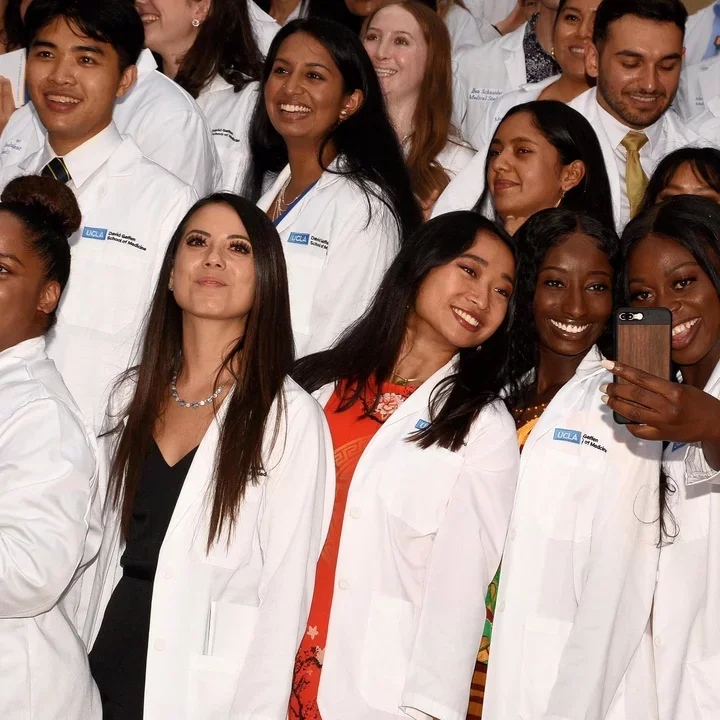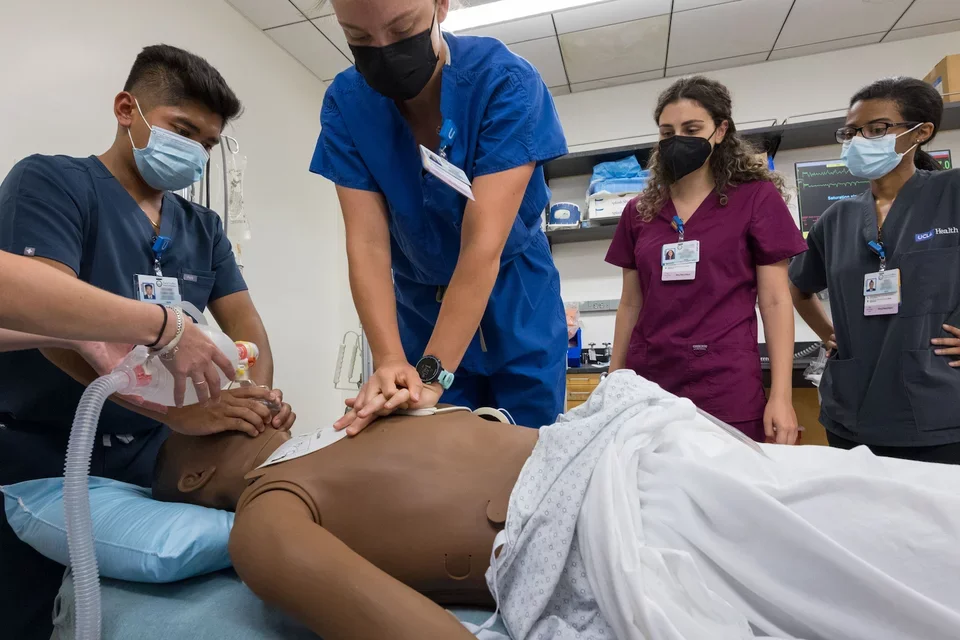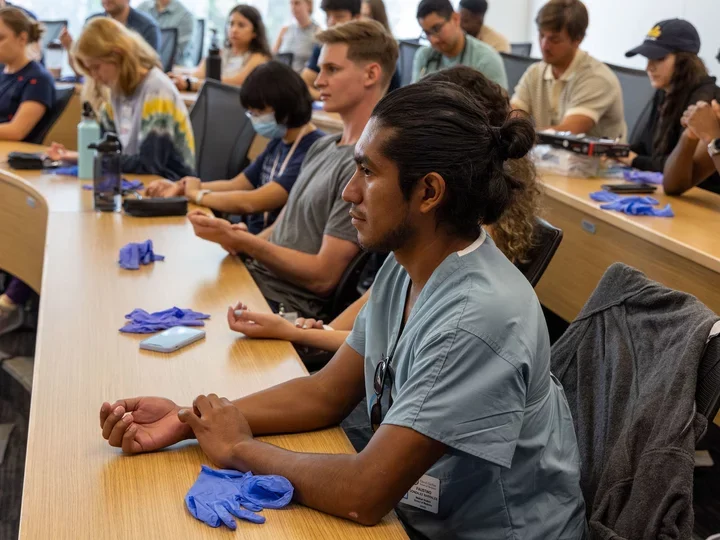Education
We welcomed a diverse incoming class in 2022.
For incoming medical students
- 34% are first-generation college students
- 34% are from traditionally underrepresented in medicine backgrounds
For incoming graduate trainees
- 34% are from backgrounds that have been historically excluded from science
- 33% are first-generation college students

2022 Education Highlights
Accreditation
We received an eight-year accreditation from the Liaison Committee for Medical Education (LCME), which is the agency’s strongest endorsement.
We received continued Accreditation Council for Graduate Medical Education (ACGME) accreditation of 101 residency and fellowship programs providing advanced training to 1,400 trainees.
Applications
We continue to have strong interest in our education programs and have received a record number of applications from prospective students (13,000+) who applied to DGSOM undergraduate medical programs and graduate programs in bioscience.
Advancing Scholarship
New initiatives enhanced the education, training, and support available to students, trainees, faculty members, and postdoctoral scholars.

The HEALS curriculum ushered in a paradigm shift in medical education at DGSOM. In addition to a re-imagined, high-yield approach to basic science and clinical science education in the MS1 year, we have strengthened our partnerships with community organizations, and our first-year medical students are incorporated into these sites through the Early Authentic Clinical Experience.
Early clinical immersion has begun with MS2s now on clerkships. The Discovery year, a period of protected time for a deep and substantive creative and scholarly experience, launched with orientation and early preparation activities. We are grateful to the many faculty mentors who are participating in the inaugural year of Discovery, which formally will begin with the 2023/24 academic year.
In launching the new curriculum, DGSOM is committed to ensuring the education and training we deliver continues to be dynamic and responsive to change. In partnership with students, course directors, the Educational Measurement Unit, and the Curricular Affairs Office staff, our curriculum will evolve through continuous quality improvement to ensure our students are prepared for new developments in science and medicine.
Progress Examples
- We introduced the innovative Intersessions course, situated between required clerkships, providing learning experiences covering important topics. These topics include skills sessions in preparation for ensuing clerkships, discussion of structural racism and health equity issues relevant to patient care, and reflective learning in humanism. This course is an example of excellence in collaboration, bringing together the educational expertise of the UCLA campus in delivering hands-on curricular programming.
- We enhanced the assessment of learning through the redesign and deployment of a broad battery of student assessment and program evaluation tools custom-tailored for the new HEALS curriculum. These new instruments and corresponding reporting mechanisms are designed to help students, faculty, staff, and administrators receive high-quality feedback, which allows them to engage in rapid cycle learning and quality improvement initiatives.
- The DGSOM Simulation Center held more than 22,000 learner hours of technology-based clinical simulation educational programming and delivered over 59,000 learner hours with Standardized Patients.
- We welcomed two new ACGME-accredited training programs.
- We launched GME University, a core curriculum for house staff to address common knowledge base requirements, including patient safety, contracts, health equity, healthcare costs, and quality improvement.
- Our Continuing Medical Education team accredited more than 30 professional development courses for practicing physicians and provided 375-plus hours of CME education for over 4,500 learners.
New programs and initiatives increased dialogues and strengthened the equitable foundation supporting all our education programs.
Progress Examples
- To further our commitment to justice, equity, diversity, and inclusion and to best meet the needs of medical students with disabilities, we welcomed our Director for Medical Student Disability and Accessibility Services. This important new role focuses on developing and facilitating faculty and staff training related to disability inclusion in clinical environments, determining and implementing didactic and clinical accommodations, assisting students with applying for accommodations on the USMLE Step examinations, and the overall equity and inclusion of students with disabilities in medical education at DGSOM.
- We expanded the Committee on Learning Environment Oversight (CLEO) to provide additional trainees with avenues for reporting incidents of mistreatment.
- We now provide individualized financial support for medical students through the “Finance Your Future” initiative, offering personally tailored financial aid guidance to every medical student.
- We provided, via the UCLA Summer Health Professions Education Program (SHPEP) and the Pre-Medical Enrichment Program (PREP), educationally and financially disadvantaged community college and university students with enriching educational experiences preparing them to pursue medical and health sciences careers.
- We expanded developmental community support through the UCLA Underrepresented in Medicine Center of Excellence Health Resources and Services Administration (HRSA) grant award. The Center will enhance existing pre-health profession pathway programs and develop a new program for underrepresented-in-medicine students, expanding our capacity for health disparities research and community-based training.
Progress Examples
- Continuing to offer applicants virtual interview sessions, virtual office hours, remote information sessions, and an online social engagement platform
- Expanded our interactive Humanism E-Learning Program (iHELP)
- Continuing our practice of lecture podcasting, self-paced, asynchronous learning opportunities, and remote learning experiences
